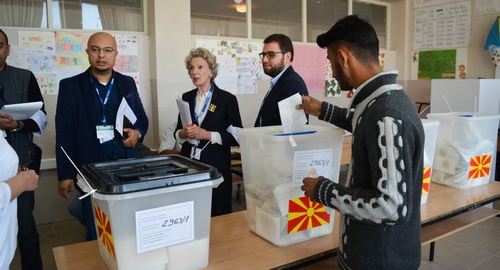Municipal elections in former Yugoslav Republic of Macedonia competitive, fundamental freedoms respected despite credible allegations of violations, international observers say
The holding of the 15 October municipal elections in the former Yugoslav Republic of Macedonia contributed to strengthening confidence in the democratic process, international observers concluded in a preliminary statement released on October 16. The elections took place in a competitive environment, with candidates generally able to campaign without restriction, and the fundamental freedoms of assembly and expression were respected overall. Some credible allegations of vote-buying, pressure on voters and isolated cases of violence occurred during the pre-election period. The monitored media provided unbiased coverage of contestants and facilitated the opportunity for political debate. Although some procedural irregularities were observed, election day generally proceeded in an orderly fashion, the observers said.

A voter casts his ballot in municipal elections in the former Yugoslav Republic of Macedonia as a team of OSCE/ODIHR observers lead by Ambassador Audrey Glover visits a polling station in the Skopje municipality of Šuto Orizari. 15 October 2017.
"The municipal elections were generally in line with international standards, and we hope that this will be a contribution for further sustainable development at the local level in order to improve the living conditions of all citizens of this country," said Karim Van Overmeire, Head of Delegation from the Council of Europe’s Congress of Local and Regional Authorities.
“While the process is not yet finished, these elections have seen this country’s democratic progress advance and the confidence and trust of the voters in the electoral process increase. We hope this will continue in the second round,” said Ambassador Audrey Glover, Head of the OSCE/ODIHR Election Observation Mission.
The country’s legal framework provides for the protection of fundamental rights and freedoms, including minority rights, and forms a sound basis for the conduct of democratic elections, the observers said. While amendments in recent years addressed a number of prior recommendations by the OSCE Office for Democratic Institutions and Human Rights and the Council of Europe, shortcomings remain, including restrictions on independent candidate registration and limited rights for legal redress. A late revision of the Electoral Code resulted in a change to the composition of the State Election Commission (SEC). This is at odds with international good practice.
Despite organizational challenges, the election administration ensured that voters had the opportunity to exercise their voting rights, the statement says. However, some SEC regulations contradicted the legislation. Commission sessions were open to observers, yet substantive decisions were frequently made in closed meetings. On the positive side, the candidate registration process was inclusive and steps to facilitate voting rights for persons with disabilities were introduced. Many interlocutors acknowledged growing confidence in the integrity of the voter register, while some continued to express concern over the implementation of the residency requirement.
Issues of women’s participation in public life were not addressed in the campaign, the observers noted. The SEC composition met the 30 per cent gender representation requirement; however, it was not always respected at lower levels. Some candidate lists did not comply with the legal requirements for gender balance, but were registered nonetheless.
The public media provided all contestants with free airtime during prime time, but only a small number of candidates used it, the statement says. Paid campaign advertising on private media was dominated by the two larger parties. Television debates were well organized, but not all invited candidates participated. The media regulator initiated several misdemeanor proceedings concerning political advertising, unbalanced reporting and the publication of opinion polls.
While campaign finance regulations have improved in recent years in line with previous recommendations, they did not fully ensure adequate transparency. Most contestants did not fully comply with the legal requirements for interim reporting on the campaign finance.
Despite the credible concerns over violations, the SEC and other authorities received few complaints, some of which are under investigation, the statement says. A number of interlocutors informed international observers that they lacked trust in the ability of the election administration and courts to handle election-related cases impartially.
Citizen observer access to all stages of the process contributed to transparency and offered a non-partisan assessment of the elections. More than 3,000 observers were accredited for election day.
Early voting and election day progressed in an orderly manner in most parts of the country. Polling staff generally efficiently facilitated voting and adhered to prescribed procedures. However, the international observers noted some reoccurring irregularities, including group voting and compromised vote secrecy. During tabulation, procedures were mostly followed, although in some cases observers did not have a clear view of data entry. The SEC started releasing preliminary results shortly after polls closed, which contributed to transparency; however, results were not disaggregated by polling station, limiting the ability to scrutinize them.
Source: Organization for Security and Co-operation in Europe
- 258 reads
Human Rights
Fostering a More Humane World: The 28th Eurasian Economic Summi

Conscience, Hope, and Action: Keys to Global Peace and Sustainability

Ringing FOWPAL’s Peace Bell for the World:Nobel Peace Prize Laureates’ Visions and Actions

Protecting the World’s Cultural Diversity for a Sustainable Future

Puppet Show I International Friendship Day 2020

